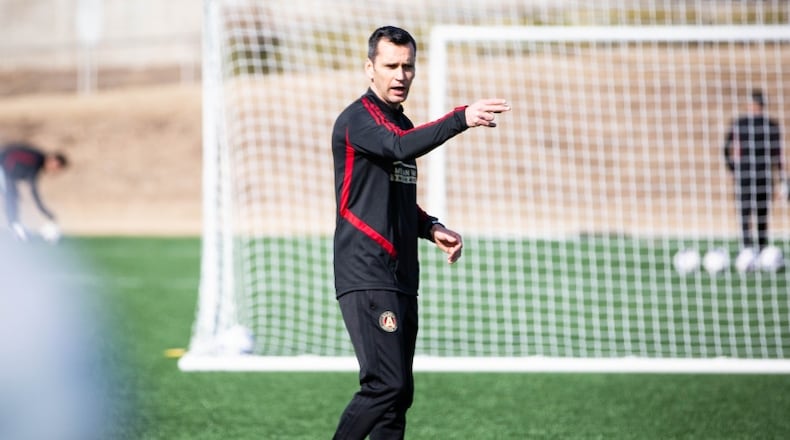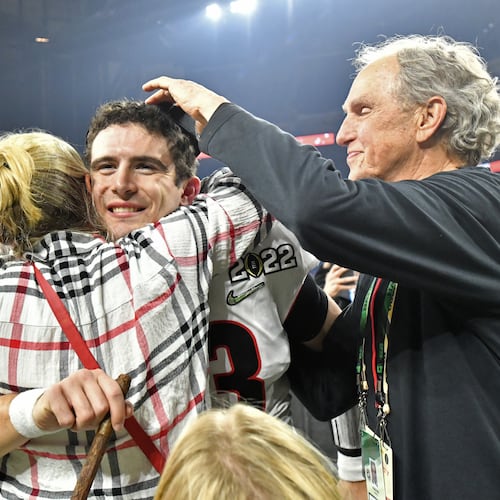Just a corner kick or so away from where Atlanta United’s interim coach Stephen Glass is trying to put back together a broken soccer team there works someone who is a handy example.
Asked if he knows the name Brian Snitker, Glass said, of course, he is familiar with the Braves manager.
But does he know the whole story? About another interim brought in to calm a struggling team in mid-season? One who was seen at the time as a temp worker but after building a coalition of player loyalty and an increasing number of wins still is in charge some four years later. No, Glass has been a little too busy trying to construct a life in a new country to dive into such details.
That could be a useful model for a fellow like Glass, who is more than half-full of ambition. Of the interim title, he says, “You don’t go into this not wanting to do it long term.”
First things first.
There are certain primal, immediate concerns for Atlanta United when it resumes MLS play Saturday night against Nashville in the once full and raucous Mercedes-Benz Stadium, now hollowed out by a virus.
Like score a goal.
Glass got his battlefield promotion from Atlanta United’s minor league team July 27 following the big club’s disastrous swing through the MLS is Back tournament. Losing three games in the same numbing 1-0 fashion was a humiliating turn for a franchise two years removed from a championship and considered the league’s model citizen. Throw in a 3-0 loss to Club America in a side match and it has been four straight without a goal. Scoreless and at times apparently clueless was no way to come back from the coronavirus break. Thus was coach Frank de Boer “mutually agreed” out of town.
In the month since Atlanta United last went pointless, Glass’ aim has been to try to pump up a team that had begun to look like one of those inflatable front-yard Santas on Dec. 31.
“Remind them why they were brought to the club, what they were meant to play for, what we represent, all of it,” he said.
“I think that had been lost along the way. That’s been the messaging – not trying to confuse them, not trying for us as a staff to be clever. Go back to the simplicity of why they are here. They’re all good players. They were brought to the club to play in a style the club believes they can play in. That’s what we want to get back to.”
When 44-year-old Glass first developed the itch to coach, while playing for Hibernian F.C. in his native Scotland in 2003-07, he was attracted to the profession by his coach Tony Mowbray. His style just synched with Glass’ style.
“He was very positive, allowed players the freedom to express themselves as long as long as you did your work for the team,” he said. “He promoted younger players. He liked energy on his team. No nonsense, not trying to be clever, just simple ideas that he explained really well.”
He’s going to put that simple, effective communication to the test Saturday, his debut as a big-market coach. Nervous? Not much yet.
“The one thing that gives me a lot of confidence and belief at the moment is I know we have a fantastic group of players,” he said. “When you go in knowing you’ve done everything you can do and the group of players are ready and excited, then I think there is a comfort level that comes knowing you’re as prepared as possible.”
When players cut through his thick brogue, they’ll find, he said, a coach who preaches aggressive, pressing soccer – you know, the way they used to in the glory days of, oh, two years ago. Recently, Glass said, Atlanta United players “looked like they were playing a little bit restricted.” Goal-scoring constipation is not a pretty sight.
Glass hasn’t had time to establish an identity with this team, but once he does, this is what he wants Atlanta United’s loud cadre of followers to note: “I hope they’re going to see an aggressive team on their front foot. A team that is not going to stand and wait and see what happens. A team that’s able to defend if we are under pressure for long spells, that we’re resilient enough to stand up to anything a team throws at us. They will be hard working; they’ll be organized and you’re going to see good players organized in a manner that’s built to attack and win games.”
He’ll need to get more from the likes of Pity Martinez and Ezequiel Barco, this team’s tip of the spear with Josef Martinez still laid up.
How exactly to do that, coach? “Just putting them in situations that suit them,” Glass said. “There are ways to set up teams for certain individuals that allow them to flourish, and I think those guys will know what role they’re playing more clearly (as in facing ever toward the opponent’s goal, and direct play toward them).
“They’re obviously hugely talented individuals, and you’ve seen it when they are put in positions where they can flourish, they will. They have to be put there as often as possible,” Glass said.
Unlike Snitker in 2016, Glass is taking over a team that had won one championship and was a goal away from getting back to another championship game in its past two years. Personnel is markedly different now, but any coach taking over such an accomplished franchise has to believe he can get it back on the rails quickly.
If he can make Atlanta United look like Atlanta United again, then perhaps he can make that “interim” qualifier disappear, too.
“I’m aware what can happen. I know there’s a possibility of that happening,” he said. “And there’s always the possibility that you win a ton of games and they still bring in another manager.
“I’ve taken the stance, like I’ve always done, I’m going to work as hard as I can for the people who employ me. Long term I don’t decide who the next Atlanta manager is, but the actions of the staff and myself can influence what happens.”
Just score a goal first, then we’ll take it from there.
About the Author
The Latest
Featured



